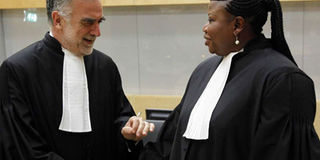Investigating Ocampo, and why we didn’t ask the right questions

Former ICC prosecutor Moreno Ocampo (left) with Ms Fatou Bensouda who took over after he retired. PHOTO | FILE | NATION MEDIA GROUP
What you need to know:
- Investigative journalism is reporting of concealed or unknown information that often requires persistent and untiring digging and searching.
- Mr Ocampo is now the subject of a more sustained and well-funded investigation by a group of mainly European journalists.
- He is also accused of impropriety with regard to other African cases and benefiting his bank balance after leaving the ICC.
A story by Kipchumba Some published on Saturday on how the Kenyan cases damaged the reputation of former ICC chief prosecutor Luis Moreno Ocampo, now the CEO of global consulting firm Moreno Ocampo LLC based in New York, identified Elizabeth Brown as his secretary.
She has written to say she is his executive director, not secretary, and demanded a correction. This is an indication of how people, rightly, seriously take errors concerning their person.
But this piece is not about Ms Brown. It’s about Mr Ocampo and investigative journalism. Investigative journalism is reporting of concealed or unknown information that often requires persistent and untiring digging and searching.
The scale and scope varies depending on the subject matter, the purpose of the story, as well as the capacity and resources available to the journalist.
SEVERAL EMAILS
For example, Mr Some wrote his story after unsuccessfully trying to interview Mr Ocampo in New York in April this year while he was a student at Columbia University.
After several emails, Mr Some received a response from Ms Brown, saying Mr Ocampo would not grant him an interview.
Mr Some wanted to get his views on why his case against the Ocampo Six — who included President Uhuru Kenyatta and his deputy William Ruto — collapsed.
Mr Ocampo is now the subject of a more sustained and well-funded investigation by a group of mainly European journalists. The journalists have combined resources under the Court Secrets project that has brought together over 20 journalists in 11 countries in Europe and Africa. Court Secrets is now publishing a series of articles that have painted Mr Ocampo as deeply tainted.
They are investigating Mr Ocampo’s prosecution policy and actions, including his handling of the Kenyan cases.
OCAMPO
In contrast, while he was prosecuting the cases, Mr Ocampo was lionised in Kenya. When he visited in 2009 he was received by President Mwai Kibaki and Prime Raila Odinga.
His picture adorned matatus. A popular singer composed a song in his praise. At the Nairobi Animal Orphanage, he adopted a cheetah and named it Ocampo.
The media in Kenya did not have the capacity or the will to investigate the way he prosecuted the Ocampo Six although there were some brave attempts. Take Jeff Koinange’s 43-minute television interview at a bench in the ICC Square in The Hague published on April 10, 2011. “Wow! What a guest! What a show! What a place! What a park! What a Hague! What a prosecutor!” Mr Koinange said in his usual bombast at the conclusion of the interview.
“You simply cannot get a fine guest like Luis Ocampo anywhere else but right here on this bench in this town on your award-winning station K24 where we are, even in the times of the Ocampo Six, all Kenyan…” Looking into the camera with his bushy eyebrows, trimmed white beard, sly smile and half-squinting eyes, Mr Ocampo completed the homily: “All the time!” Mr Koinange then burst with mirthful laughter. “Good job!” he said.
RIGHT QUESTIONS
It was, indeed, a good attempt, if not a good job, on the part of Mr Koinange. He asked the right questions, including why Mr Ocampo so conveniently came up with an equal number of suspects from the political divide — three from ODM and three from PNU — and why he did not go for the top leadership, Kibaki and Odinga. Mr Ocampo gave slick answers.
We now know that Mr Ocampo was not the knight in shining armour. Revelations show his departure from ICC did not stop him from pushing the court to prosecute the Ocampo Six despite a lack of evidence and unreliable witnesses. And when Uhuru Kenyatta was elected president he operated behind the scenes to offer him “an honourable exit”.
He is also accused of impropriety with regard to other African cases and benefiting his bank balance after leaving the ICC.
Mr Ocampo has denied any impropriety. Whether he is guilty or not, Court Secrets shows the power of investigative journalism.
Send your complaints to [email protected]. Text or call 0721 989 264.





